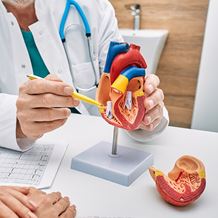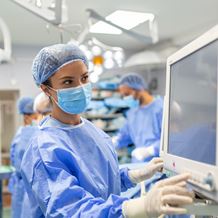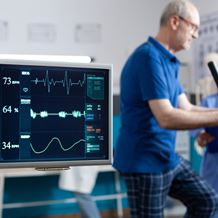Heart Valve Surgery Recovery
Heart valve surgery can be performed as open surgery or minimally invasive surgery, depending on your situation, and it aims to repair or replace one or more of the four heart valves. Recovery will depend on the extent of the surgery, and this will look different for every patient. Much of it will depend upon your age, health and wellbeing coming into the operation, and how well you commit to your own recovery and rehabilitation. Taking an active role is crucial to achieving the best possible outcome – and this starts right from the moment you decide to have surgery. Rehabilitation is a vital part of your recovery process, and our specialist rehabilitation team are here to support you at every step as you regain strength and return to health. Please ask about our dedicated cardiac rehabilitation program that you can access through your hospital.
Home preparation for heart valve surgery
Preparing for your discharge in advance of surgery is an important part of the recovery process. You are likely to remain in hospital for approximately one week after the procedure, so it’s important to ensure you have a supportive environment on your return home. Leaving the security of the hospital environment can feel overwhelming at first, and it is completely normal to experience some emotional swings as you recover. Arrange for someone to help transport you home from hospital. Your medical team will provide you with resources that include information on:
- Your medication requirements
- Any help or special considerations that may be required at home such as food preparation and sleeping arrangements
- How to set up a recovery space and what you will need
- How to bathe
- How to care for your wound after surgery
- What symptoms to look out for after surgery
Your recovery from heart valve surgery
Immediately after the operation you will be transferred to intensive care for the first 1-2 days before being transferred to the ward. You will be encouraged to get up and start walking with the physiotherapists as soon as possible. This is to prevent any blood clots or chest infections. Patients are typically discharged within seven days and your medical team will provide guidance on wound care and medication advice, follow up appointments and an individualised rehabilitation program. You may find it helpful to have someone stay with you for the first few days of your recovery.
Your doctor may recommend that you attend a cardiac rehabilitation program to help with your general recovery from surgery. Here you will benefit from a team of trained healthcare professionals including doctors, nurses, dieticians, physiotherapists, and social workers that will all guide you through the recovery period. This dedicated team will help evaluate your personal needs, including any emotional support you may require after surgery, as well as talk to you about the tools and strategies that aim to get you back to a healthy and active lifestyle. These include:
- Any risk factors – such as smoking, diet and anxiety or depression
- Medication requirements
- What to expect at each stage of your recovery
- How your family and friends can support your rehabilitation
- How to meet your personal recovery goals
- How to avoid the risk of another cardiac event
What to look out for at home
After a significant cardiac event such as heart valve surgery, it is very common to experience emotional swings as you come to terms with what has happened and progress with your rehabilitation. Many patients feel a sense of anxiety about what the future may hold. Talk to your healthcare team and others who have experienced similar circumstances for additional comfort and reassurance. You may also experience some common physical side effects after heart valve surgery that typically include a loss of appetite, constipation, tiredness, and difficulty sleeping as well as mood swings. These should typically subside over the next six weeks. You may also notice a ticking sound in your chest, or a small swelling at the top of the wound. Contact your doctor if you experience:
- Persistent and new type of chest pain
- Irregular heartbeat or palpitations
- Fever
- Dizziness, fainting or extreme fatigue
- Difficulty breathing
- Nausea and vomiting
- Wound infection
- Clicking or movement of the breastbone
- Weight loss or appetite change
Average Recovery Timeline
Week 1
- Keep the wound site clean and dry and adhere to the bathing instructions
- Protect your breastbone at all times by moving around as prescribed by your medical team
- Avoid heavy lifting
- Walking for short periods is recommended
Weeks 2-6
- Avoid stressing the chest on one side more than the other
- Talk to your doctor about returning to desk-based work with light duties
- You may start to become interested in sex again
- Continue to build up your walking distance
- Gentle tennis can start at 6 weeks
Weeks 4-6
- Talk to your doctor about a return to driving
- Avoid any strenuous exercise and heavy lifting for 3 months
- Gradually ease back into a more active life
- You may be able to return to manual labour
A full recovery can take up to several months.
Lifestyle changes
Taking steps to protect your heart health will ensure you get the most benefit from your heart valve surgery. There is an increased risk of valve infection after this procedure (endocarditis) and so maintaining dental hygiene is extremely important as bacteria can travel from your gums through your bloodstream into your heart valve. As part of the cardiac rehabilitation program, patients will have access to dietary guidance and advice on the importance of regular exercise and how to maintain a healthy weight. Patients are strongly advised not to smoke, and to adhere to any medications as prescribed by your doctor.
Heart Valve Surgery Recovery FAQs
What's next?
If you have been experiencing heart-related symptoms, book an appointment with our cardiac services specialist today.
Our specialists in Cardiac Services
View all specialists
Related content

Cardiac Services
Cardiology services at St Vincent’s Private Hospitals, advanced cardiac care.
Read More
Coronary Artery Bypass Graft Surgery
Restores blood flow to the heart by using healthy blood vessels to detour around any blockages.
Read More
Recovery
Cardiac recovery and rehabilitation programs are designed to help you after surgery.
Read More


